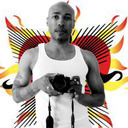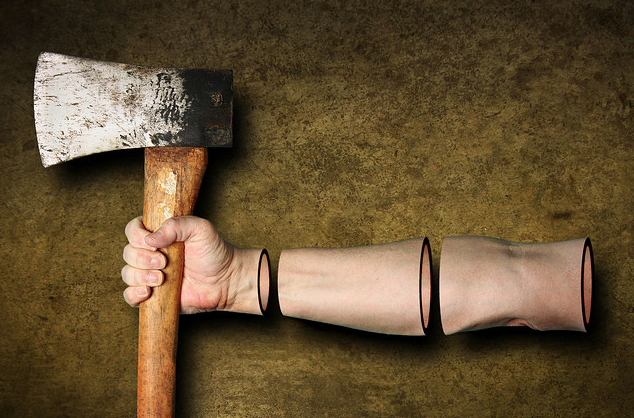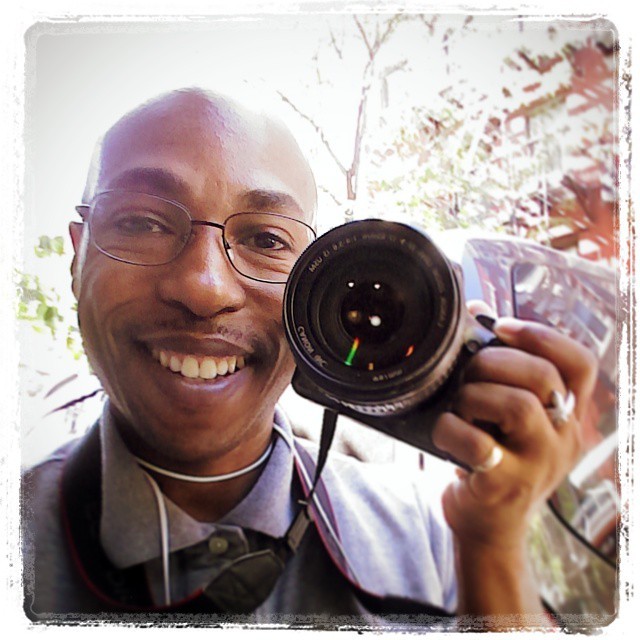Tye Fortner has fine, delicate ears, a newly pierced eyebrow, and a trim beard. He’s wearing honey-colored contact lenses and a Jimi Hendrix T-shirt. “I wanted to be presentable,” he explains as a photographer snaps his portrait. “I was going to buy an outfit, but it was so hot.”
We are standing outside his apartment block in the Fordham area of the Bronx in New York City on a muggy Friday afternoon in June, a few days before Pride. A woman walks by pushing a wheeled cart from which she’s selling Italian ices. “Hey mama!” Fortner calls to her and asks for a scoop of mango and cherry that stains his teeth red. Refreshed, he leads the way up the stairs to the roof of his building, where he takes out a packet of Newports and, perched high above the city, begins to tell his story.
Fortner was 22 and homeless when he started feeling weak, with crushing stomach pain and terrible headaches. A sex worker from the age of 16, sometimes too high on crack to remember to use protection, he had been putting off the inevitable for weeks before he finally decided to get tested for HIV. The result came back positive.
“My whole world changed,” Fortner says, recalling the moment six years ago when he received his diagnosis. At first it changed for the worse as he struggled to come to terms with his diagnosis.
But then, it changed for the better.
After years of homelessness and a day-to-day existence, Fortner, now 28, was faced with the tantalizing prospect of a place to sleep, regular meals, and more thorough New York City services provided to people who reach a certain stage of the disease. First he would have to meet their diagnosis requirements; then he would receive help.
“I didn’t know about the services,” he says. “I didn’t know that once you have AIDS you’re entitled to all this other stuff.”
That silver lining was a surprise to Fortner. And while it might seem counterintuitive, contracting the virus has made life easier for other young homeless men in New York City, who in return for developing full-blown AIDS gain a roof over their heads and basic services.
This cruel paradox — having to get really sick in order to enjoy a better, more comfortable life — has not gone unnoticed. “I have experienced people [who are] grateful that they have HIV,” says Sage Rivera, a research associate at the Centers for Disease Control and Prevention who has worked with hundreds of LGBT youth. “It’s sort of like a sigh of relief or an extra boost,” he says. “There are a whole bunch of different names for HIV within the [LGBT] community: ‘the monster,’ ‘the kitty,’ ‘the scratch,’ ‘the gift that keeps on giving.’ So people say, ‘I have the kitty — so now I can get my place. Now I can get hooked up; I can get my food stamps, I can get this, I can get that.’
“Other people say, ‘I do not know what I would have done without the monster.’ I can think of five boys, automatically, who’ve told me this.”
And it’s not just those who already have AIDS who view it as a lifeline; some young men who test negative aspire to contract the disease as a way out of trouble. Rivera knows at least one man who planned to have unprotected sex on purpose, an attitude he sums up thus: “My life is not getting better. I need a helping hand, and it seems like the only way I can get a helping hand is by getting sick.”
For Fortner, the phenomenon of young men deliberately contracting HIV is dispiriting but not surprising. “When you’re on the streets every day — winter, summer, spring, and fall — and you find a way to have an apartment of your own, it looks better,” he says. His own experience is instructive: Once his AIDS was diagnosed, he was astonished at how much easier it was to live in New York City. “Right now the rent for my apartment is $1,150, but because I’m on the program I only pay $217, which leaves me with about $400 a month,” he says. “That’s still a struggle, but I feel gifted, because one way or another I pull through.”
See more posts like this on Tumblr
#health #AIDS #HIV #OUT Magazine #LGBT #NYC #HASA #HRA #Social Services #men of color #welfare #public assistance #awarenessMore you might like
On HASA and You’re a Student?
Here’s something that your HRA Caseworker probably has not shared with you.
Did you know that HRA (aka Dept of Social Services) will reimburse your public transportation costs for each day that you are in attendance? They may even prorate the amount.
Go to your assigned HRA office and ask for form W-700D it’s a 2 page form (front and back or copied on separate pages) Get your attendance records for the semester, and past semesters. Make blank copies of the W-700D (you will need to fill this out and submit at the end of every semester (you can also do it once per month) and submitted to your HASA Caseworker or Financial Worker (best to submit it to your Caseworker), and make sure copies are made and that your sign and you are given your proof of services received every time you visit HRA.
It could take a month or two but the money will be available through your EBT (SNAP) card.
Be sure to ask your Caseworker if there are any other allowances for students whether it’s an accredited college, technical training, or trades trades training institution you are entitled to these benefits.
You don’t have to be on Public Assistance forever… The fact that you are in school shows that you looking to make a change and you deserve all the assistance you can get!
Get it!
Social Security and HASA
Tomorrow I have an appt with Social Security. I have to apply for SSI/SSD. Insane, I have been applying and appealing for 3 and-a-half years. HASA, a division of NYC - HRA requires that all clients, not currently receiving social security benefits, apply for benefits and appeal all negative decisions, forever!
In order to continue receiving benefits from the city (local government) I must apply for federal benefits. Why is this a requirement? I may never become eligible for SSI/SSD until I am in my retirement years.
Medically, I meet the requirements to receive benefits through HASA. I feel it’s unconstitutional to force me to apply for a federal program that I do not qualify for in order to keep receiving the benefits that I have been getting for over three years.
I am not looking to remain on HASA for the rest of my life. I am employable and I hope find gainful employment someday. Getting approved for SSI/SSD won’t make life better for me; the local government wants the feds to take me as their ward. It’s all about money, not about the welfare of the client (me).
Her is what I found from agency providing legal service to HASA clients. (source: South Brooklyn Legal Services)
3. HASA clients are required to apply for SSI (and SSD) and to complete the administrative process. This means that they are required to appeal any denials until they have had a hearing. Therefore, as an advocate, you cannot tell a client not to pursue his/her claim for SSI. However, it is very important to advise HASA clients if they will not financially benefit from receipt of SSI so that clients do not have the expectation of increased benefits or experience undo stress worrying about their SSI claims.
4. Who Benefits from Receipt of SSI? There are still limited situations in which a HASA client might benefit financially from receiving SSI. The two most common examples are if:
a. the rental amount for the household is very low; or
b. client is in scatter site housing or other subsidized housing in which client’s rental amount is a percentage of his/her income.
Please note, a & b: Neither apply to me.
SMH
I am not a Con(Ed)

I’m at the NYC-HRA HASA office submitting my electric bill.
I don’t feel that I should be responsible for the first month-and-a-half of service. My case worker demanded that I start an account prior to inspecting the APT (the APT must inspected and the lease approved in order to move in). Having the utilities on is not a requirement for inspection!
Final approval took over a month and I moved in a week after. I ended up with a bill from ConEd for services I didn’t use.
Anyway, HRA will pay the bill but I have to pay it all back. SMH!
Have a HAART… (part II)
A lot happened over the weekend….
I started HIV-treatment… just 3 pills a day… I’m feeling just fine… no side effects
I also, went on a date… first date in a very very very long time. Had a wonderful time… we did kiss… first kiss in over 2 years for me… He says that he would like to see me again… He is HIV negative; that kicked up a few things with me. This would be first for me as well; I have only ever dated someone that is pozitve since my diagnosis 10 years ago.
Let’s see… what else… I started taking lessons in sign language… 1-on-1 for an hour on Sundays.
I am still transitioning off of public assistance. Starting next month, I will be paying about 90% of my rent… I can still receive Food Stamps for about a year and keep Medicaid because my employer doesn’t offer health insurance at this time.
In just 2 months, I will be 40 years old. I am still working on my 40lbs by 40yo Challenge. I need to lose 13 more pounds. However, I am not sure how much fat I have actually lost. I know that I have gained muscle and my waist size is getting smaller. So, there is a chance that I might hover around my current weight of 171lbs if I continue to gain muscle mass and shed some fat. Anyway, I feel great.
___________
Just wanted to give a quick update on what’s happening with me.
In the newest version of the 2012 budget, Mayor Bloomberg has chosen to cut more than $5 million in supportive housing services for the neediest clients at the HIV/AIDS Services Administration.
“It’s backward and it’s shortsighted,” said Kristin Goodwin, Housing Works’ director of NYC policy and organizing. “Supportive housing is the number one proven way to keep vulnerable individuals stable and healthy. New York City is going to end up paying millions in emergency services because Bloomberg is pushing people onto the streets.” READ MORE
Bloomberg proposes cuts to successful programs meant to help the neediest.
I am extremely grateful for BATF’s help with finding me the HASA subsidized apartment where I currently reside. The supportive housing resident I used to live in had stopped providing certain much needed services more than a year ago due to city budget cuts. Now with these newly proposed cuts so many more services will not be provided. This is frightening.
We walked so that people infected HIV can have access to much needed services. NYC TriState area is in the top 10 of highest rate of new infections in the U.S. Money raised through such events like AIDS Walk New York will help fund Outreach and Prevention services. Again, we are all living wit HIV so, find out what you can do in your local community and/or learn more about HIV awareness and prevention.
An experimental vaccine could prove to be the ultimate weapon against AIDS, research suggests.
Studies indicate it has the potential to clear the body of all traces of the AIDS virus, HIV.
Uniquely, the injected vaccine is carried by a persistent virus which remains in the body for life.
Cytomegalovirus (CMV) enables the immune system to be constantly on the alert for HIV.
Researchers in the US used different versions of the vaccine against a monkey form of the AIDS virus, Simian Immunodeficiency Virus (SIV), with outstanding results.
More than half the rhesus macaques monkies treated responded to the point where even the most sensitive tests detected no signs of SIV.
To date, most of the animals have maintained control over the virus for more than a year, gradually showing no indication they had ever been infected.
Unvaccinated monkeys infected with SIV went on to develop the monkey equivalent of AIDS, caused by the collapse of their immune systems.
The findings suggest the vaccine could be effective enough to rid the body of immunodeficiency virus completely, according to the scientists writing in the journal ‘Nature’.
Conventional antiretroviral therapies are able to control HIV infection, but cannot clear the virus from its hiding places within the immune system’s white blood cells.
Study leader Dr Louis Picker, from Oregon Health & Science University’s Vaccine and Gene Therapy Institute, said: “The next step in vaccine development is to test the vaccine candidate in clinical trials in humans.
"For a human vaccine, the CMV vector would be weakened sufficiently so that it does not cause illness, but will still protect against HIV.”
CMV belongs to the herpes family of viruses, and like other members of the group never leaves the body once an infection has occurred.
An estimated half of all adults in the UK carry CMV but suffer no or few symptoms.
The virus is spread through bodily fluids such as saliva and urine.
When symptoms do occur, they are similar to those of flu including a high temperature and swollen glands as well as tiredness.
People with weakened immune systems can have a more severe response.
Today I’ll be in front of the camera, and not behind it. Promoting #HIV #awareness and the need for a #cure
#models #AIDS #poz #NYC #photography #stevenduarte #instagay #instahomo
February 7, 2012 is National Black HIV/AIDS Awareness Day (NBHAAD). NBHAAD is a national community mobilization initiative designed to encourage HIV prevention, testing and treatment among Blacks and African Americans in the United States. This year’s theme is “I am My Brother’s/Sister’s Keeper: Fight HIV/AIDS.” NBHAAD main objectives are to:
- Educate and distribute information about HIV/AIDS locally;
- Promote and provide HIV Testing;
- Increase HIV/AIDS community mobilization and involvement efforts locally; and
- Encourage linkage to care and treatment for those newly diagnosed with HIV and promote reengagement to care and treatment services for people living with HIV.




 elixir
elixir